A man died this Monday after suffering a wasp sting in the Murcian district of La Alberca. He was in the vicinity of the Makro supermarket when, at around 8:20 a.m., he suffered the insect sting and fainted in the road.
A Mobile Emergency ambulance was moved to the scene where it was found that the man suffered a cardiac arrest. The paramedics performed cardiopulmonary resuscitation on him for more than 35 minutes, but they were unable to save his life.
It was subsequently found that the man was allergic to wasp stings.
A National Police patrol was mobilized to the scene, as well as a coroner from the judicial authority who was able to remove the body.
Serious reactions to wasp stings increase by 20%
Serious allergic reactions due to wasp and bee stings have increased by around 20% in the last ten years, according to the Ministry of Health. Most of these cases occur during the summer, when these insects are more active and more outdoor activities are carried out.
A spokesman for the Ministry said that it is advised to look closely at the bite: a local reaction of up to 10 centimetres with some pain or discomfort can be considered to be normal and not excessively worrying, but if the reaction covers a larger area or presents symptoms such as a generalized rash dizziness, nausea, vomiting, a feeling of suffocation or hypotension, you should consult an allergist, as these are symptoms that are considered serious.
In the case of any insect bite, the first measure is to thoroughly wash the area with water. In the case of specific stings such as bee stings, they usually leave in the stinger, so it is necessary to carefully remove it without causing it to break. After washing with water, a cold flannel, ice or a compress, can be applied to the area for a few minutes to relieve pain and inflammation.
In case of local reactions, it is advisable to apply an ammonia-based cream or liquid to reduce the effect. You can also take an antihistamine, but always under medical prescription.
Looking ahead to the summer season, allergists recommend extreme caution when outdoors and say that people should avoid, as far as possible, eating in the open since, they warn, insects will always look for food.
In addition, on field trips, clothing that covers the skin should be worn, preferably with long sleeves, long pants and socks, and dark and bright colours should be avoided as these also attract mosquitoes.
Allergy specialists consider it advisable not to approach beehives or wasp nests and, if one of these insects lands on any part of the body, do not try to kill it or scare it away and remain still or make slow movements until it moves away.





